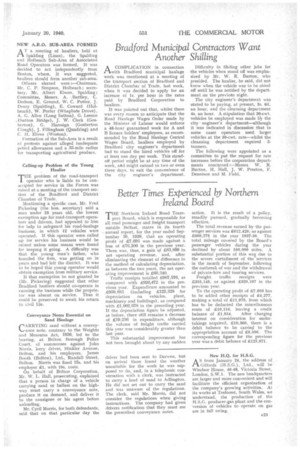NEW A.R.O. SUB-AREA FORMED
Page 25

If you've noticed an error in this article please click here to report it so we can fix it.
AT a meeting of hauliers, held at Spalding (Lines), the Spalding and Holbeach Sub-Area of Associated Road Operators was formed. It was decided to act independently from Boston, where, it was auggestecl, hauliers should form another sub-area.
Officers elected were :—Chairman, Mr. C. P. Simpson, Holbeach ; secretary, Mr. Albert Elsom, Spalding ; Committee, Messrs. A. Battley, C. Dodson, E. Ground, W. C. Potter, J. Drury (Spalding), E. Coward (Holbeach), W. Porter (Whaplode Drove), A. G. Allen (Long Sutton), G. Leeson . (Sutton Bridge), J. W. Clark (Gosberton), G. Haresign (Gosberton Clough), J. Fillingham (Quadring) and C. H. Elwes (Weston).
Formation of the Sub-Area is a result of protests against alleged inadequate petrol allowances and a 35-mile radius for transporting agricultural produce.
Calling-up Problem of the Young Haulier
THE problem of the road-transport operator who is liable to be conscripted for service in the Forces was raised at a meeting of the transport section of the Bradford and District Chamber of Trade.
Mentioning a specific case, Mr. Fred Pickering (the hon, secretary) said a man under 25 years old, the lowest exemption age for road-transport operators and drivers, had appealed to him for help to safeguard his road-haulage business, in which 12 vehicles were operated. If this operator were called up for service his business would be ruined unless some means were found for keeping it going. A difficulty was that the young man's father, who founded the firm, was getting on in years and had left the district. It was to be hoped this young operator would obtain exemption from military service.
If that exemption be not granted he (Mr. Pickering) suggested that other Bradford hauliers should co-operate in running the business while the proprietor was absent on service. Thus it could be preserved to await his return to civil life.
Conveyance Notes Essential on Sand Haulage
CA RR YING sand without a conveyance note, contrary to the Weights and Measures Act, 1936, led to the hearing, at Bolton Borough Police Court, of summonses against John Norris, lorry driver, Hinkle'. Avenue, Bolton, and his employers, James Booth (Bolton), Ltd., Randall Street, Bolton. Norris was fined 15s. and his employer £1, with 10s. costs.
On behalf of Bolton Corporation, Mr. W. L. Hall, prosecuting, explained that a person in charge of a vehicle carrying sand or ballast on the highway must carry a conveyance note, produce it on demand, and deliver it to the consignee or his agent before unloading. Mr. Cyril Morris, for both defendants, said that on that particular day the driver had been sent to Darwen, but on arrival there found the weather unsuitable for the work he was supposed to do, and, in a telephonic conversation with a clerk, was instructed to carry a load of sand to Adlington. He did not set out to carry the sand and was unaware of the regulations. The clerk, said Mr. Morris, did not consider the regulations when giving instructions. The company had given drivers notification that they must use the prescribed conveyance notes. New H.Q. for H.S.G.
A S from January 24, the address of
Gilfords (H.S.G.), Ltd., will be Windsor House, 46-48, Victoria Street, London, S.W.1. The new headquarters are larger and more convenient and will facilitate the efficient organization of the company's growing activities. At its works at Treforest, South Wales, we understand, the production of the H.S.G. producer-gas plant and the conversion of vehicles to operate on gas are in full swing.




























































